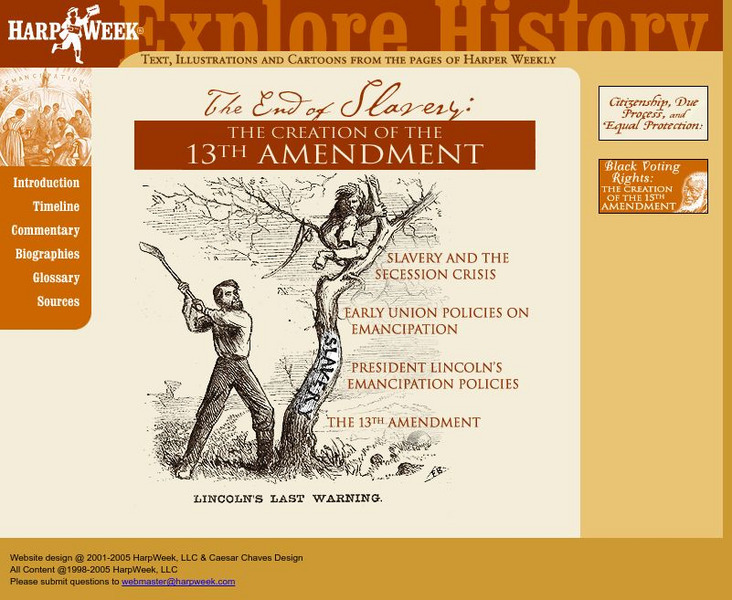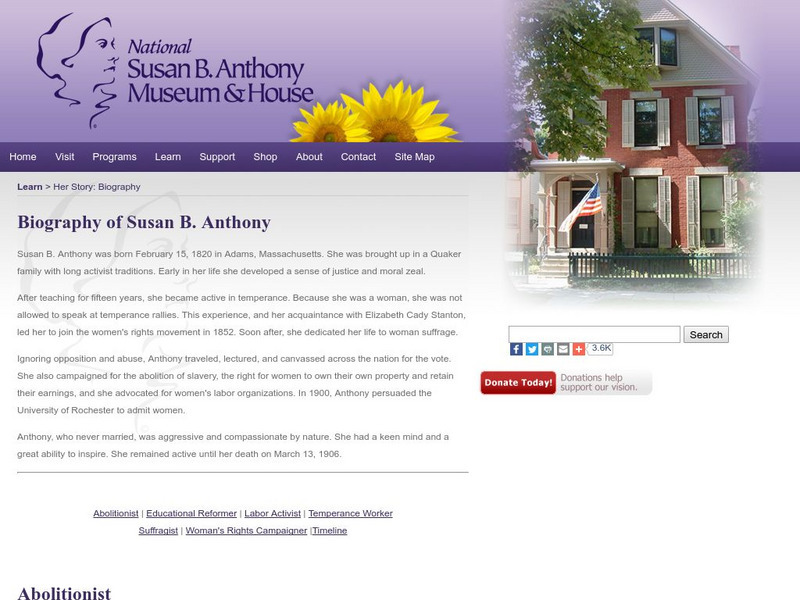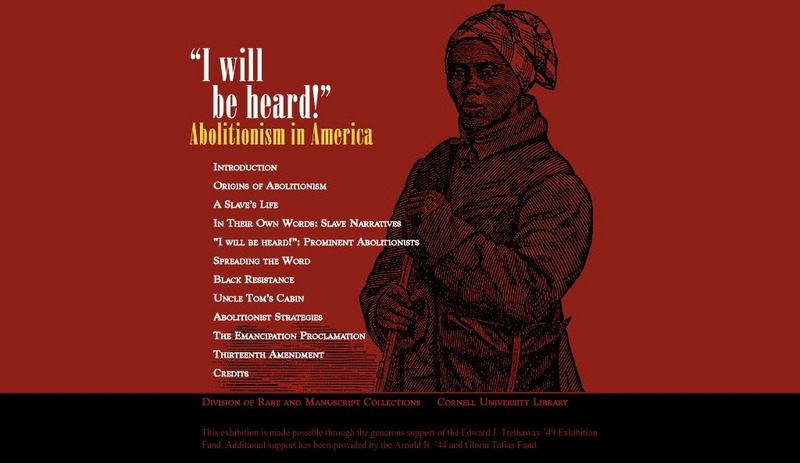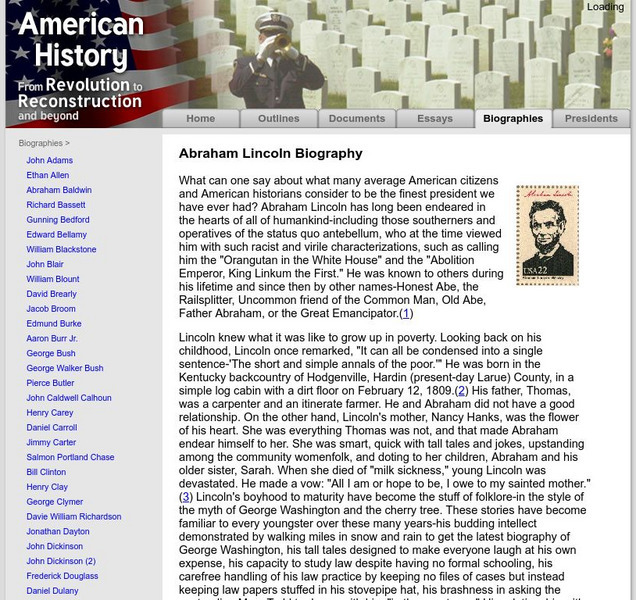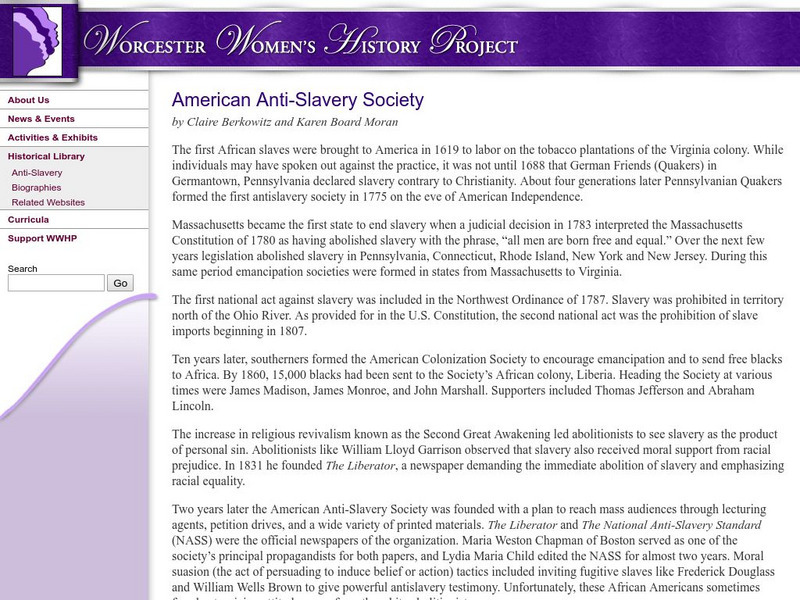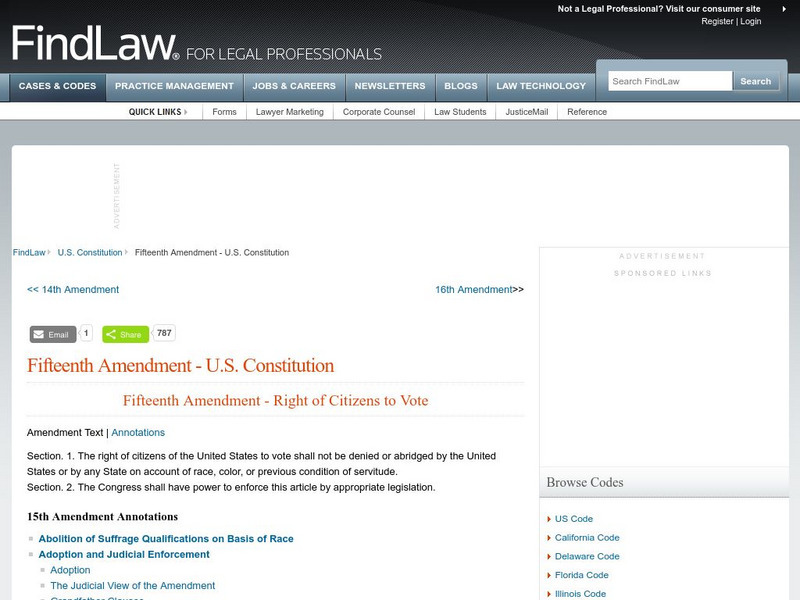US Government Publishing Office
Ben's Guide to u.s. Government: Emancipation Proclamation 1863
Ben's Guide is a fun way to present U.S. Government to students grades K-12. This site presents a brief overview of the Emancipation Proclamation. Includes the transcript of the document. Links to related sites are available.
Other
19th C. u.s. Women's Writings: Lydia Maria Child's "Slavery's Pleasant Homes"
Text of several of Lydia Child's writings that supported her abolitionist sentiments.
Harp Week
The End of Slavery: The Creation of the 13th Amendment
What a wonderful resource for researching the attempts to solve the issue of slavery prior to the Civil War, and the eventual ratification of the 13th Amendment. Find a timeline of legislation limiting the spread of slavery from 1787...
Choices Program, Brown University
Choices: A Forgotten History: The Slave Trade and Slavery in New England
Unit explores, through a series of videos from notable scholars, the effects of the trade in slaves and of slavery itself on the new Americans of the time and helps students to understand how history, and the telling of history, affects...
Other
University of Michigan: Susan B. Anthony House: Susan B. Anthony
This resource divides her life into the following parts: abolitionist, educational reformer, labor activist, temperance worker, suffragist, and women's rights campaigner.
PBS
Pbs: Angelina and Sarah Grimke
A biography of the Grimke sisters, women who were before their time in so many ways and who fought for equality of the sexes.
Cornell University
Cornell University: Library: I Will Be Heard! Abolitionism in America
A collection of original manuscripts, letters, photographs, rare books, and other materials on abolitionism from the 1700s through 1865.
Smithsonian Institution
National Portrait Gallery: Civil War@smithsonian
Access to the Smithsonian's extensive collections that document the American Civil War.
Cornell University
Cornell University: Library: I Will Be Heard: The 13th Amendment
Read the text of the 13th Amendment, adopted in January, 1865, even before the end of the Civil War, which ended slavery in the United States. Click on the image to see a larger picture of the document itself.
Mariners' Museum and Park
Mariners' Museum: Captive Passage: The Transatlantic Slave Trade
Online exhibition from the Mariners' Museum chronicles the plight of African slaves from the beginning of their journey when they are torn from their homeland all the way to the shores of the Americas. Caught up in the lucrative...
Library of Congress
Loc: Elizabeth Cady Stanton Papers
The papers of suffragist, reformer, and feminist theorist Elizabeth Cady Stanton cover the years 1814 to 1946, with most of the material concentrated between 1840 and 1902. Consisting of approximately 1,000 items, the collection contains...
British Library
British Library: Creative Writing: Ignatius Sancho, Letters of the Late Ignatius
This teaching pack will introduce students to Ignatius Sancho in his own words through a selection of his letters and invite students to offer a variety of creative responses to Sancho's life, work, and unique voice. Students will work...
PBS
Pbs Learning Media: Primary Source Set: Uncle Tom's Cabin Harriet Beecher Stowe
This collection uses primary sources to explore Harriet Beecher Stowe's Uncle Tom's Cabin.
Google Cultural Institute
Google Cultural Institute: African American Women and the Civil Rights Movement
This exhibit spotlights the voice of African American Women leaders in the movement and highlights their significant roles and contributions.
National Humanities Center
National Humanities Center: Toolbox Library: Poets, Making of African American Identity: V. 1
The writings of four African Americans poets from the late-eighteenth to the mid-nineteenth centuries that examine slavery, abolition, and emancipation. These authors include Phillis Wheatley, George Moses Horton, James Whitfield, and...
University of Groningen
American History: Biographies: Abraham Lincoln
What can one say about what many average American citizens and American historians consider to be the finest president we have ever had? Abraham Lincoln has long been endeared in the hearts of all of humankind-including those southerners...
Library of Congress
Loc: African American Mosaic: Black History and Culture
Online version of a Library of Congress exhibit, covering information about black history, including colonization, abolition, migrations, and the WPA. It is multimedia and contains hundreds of primary source documents.
Other
Wwhp: American Anti Slavery Society
A good review of the evolution of the support for the abolition of slavery from the first anti-slavery organization formed by the Quakers to the support for Abraham Lincoln as president. Focus is on the American Anti-Slavery Society and...
Thomson Reuters
Find Law: u.s. Constitution: Fifteenth Amendment
This resource provides the 15th Amendment, which declares the Right of Citizens to Vote, with annotations on Abolition of Suffrage Qualificatrions, Adoption and Judicial Enforcement, and Congressional Enforcement.
Independence Hall Association
U.s. History: Religious Revival
The Second Great Awakening was transformative in ways beyond religion. Read about the new ideas about religion and see how they emphasized individual dignity and worth. This then reflected on the early ideas of women's suffrage, and the...
BBC
Bbc: Bitesize History: Industrial Era: Triangular Slave Trade: Interpretations
Discusses the different interpretations that historians have had of the slave trade. It includes a video of Interpretations of the abolition of slavery, questions with answers, and a link to an assessment.
Black Past
Black Past: Forten, James (1766 1842)
An encyclopedia article about James Forten, a free black man, who fought in the Revolutionary War, and later became a supporter of abolition and suffrage.
Khan Academy
Khan Academy: Ap Us History: 1844 1877: The Civil War: Emancipation Proclamation
Discusses the background to the Emancipation Proclamation and how Abraham Lincoln came to support the abolition of slavery and the difficulties that were encountered around this issue. Explains that it did not apply to all slaves as...
Independence Hall Association
U.s. History: The Emancipation Proclamation
The Emancipation Proclamation in 1863 really didn't free a single slave. Read about why that was true, but also find out why Abraham Lincoln felt is was absolutely necessary to make a stand on ending slavery when he did, and how the...
Other popular searches
- Abolition Movement
- Abolitionists
- Abolition of Slavery
- Abolitionist Movement
- Abolition Slogans
- Abolition and Suffrage
- Abolition and Women's Rights
- Abolition Debate
- Slaves and Abolition
- Abolition of Slavery Laws
- Abolition in America
- Abolition Crusade




